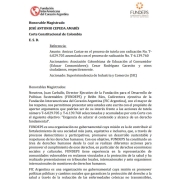We have a front labeling law!
Last Tuesday, October 26, in the Chamber of Deputies, with 200 votes in favor, the sanction of the Law for the Promotion of Healthy Eating was achieved, better known as the frontal labeling law.
“Below, we offer a google translate version of the original article in Spanish. This translation may not be accurate but serves as a general presentation of the article. For more accurate information, please switch to the Spanish version of the website. In addition, feel free to directly contact in English the person mentioned at the bottom of this article with regards to this topic”.
For years, in Argentina we did not know if what we ate hid any risk to our health. The increase in diseases related to poor diet (such as diabetes, hypertension and certain types of cancers), determined the need for the Argentine State to start moving forward with regulations that put the health and quality of life of the population as a priority. . After almost a year after the project left the Senate, and after several marches and countermarches, deputies were able to put aside their partisan differences, to finally approve the Front Labeling law.
This law protects three fundamental rights: health, adequate food and information in consumer relationships. For this, the regulations establish that all products packed in the absence of the customer and containing a high content of critical nutrients -such as sodium, sugar and fat- bear, on the main face of the container, black octagons with the legend “Excess in” . In this way, it is sought that simple and reliable information is available when deciding what to eat. In other words, the sale of any product is not prohibited, but rather it is intended to adequately warn of the true composition of what is being consumed.
More than a black seal
Throughout all this time, from various academic sectors and civil society, we highlight the comprehensive nature that the regulations managed to meet. This is due to the fact that, around the chosen labeling system, other regulations have been established that strengthen the protection of the right to health. These are the restrictions on advertising, promotion and sponsorship, regulations in educational establishments and in public purchases by the State.
With regard to marketing, the law requires that when a product is advertised that contains at least one warning seal, all the black octagons that this product bears are visible and / or enunciated. It only prohibits advertising when it is directed at children and adolescents and it is a product with excess fat, sugar and sodium. Given that we are in the presence of a regulation that seeks to protect children above all, the law also establishes that groceries with one or more warning stamps cannot have so-called “shopping hooks” on their packaging, such as drawings. cartoons, cartoons, famous people, athletes, etc. This is important because nothing that appears in the packaging of a product is the result of chance. On the contrary, it has been the object of analysis with the deliberate purpose of attracting the public, especially those who are in the development stage and who may not have enough knowledge to decide freely.
Regarding the educational establishments that make up the initial, primary and secondary level, the products that contain at least one warning seal or precautionary legends (“contains sweeteners, not recommended in children” or “contains caffeine, avoid in children / as ”) cannot be offered, marketed, advertised, promoted or sponsored. Likewise, in order to contribute to the development of healthy eating habits and warn about the harmful effects of an inadequate diet, the regulations also propose the development of minimum contents of nutritional food education in schools.
Finally, in relation to purchases by the State, the Public Administration must prioritize the contracting of all those products that do not have stamps. In this way, it seeks to positively impact the health of the most vulnerable sectors of the population, who are those who are most exposed to the consumption of processed and ultra-processed products.
Thus, the new law is positioned as an instrument capable of transforming the way in which the Argentine State addresses the food problem. For decades, policies have been replicated without taking into account nutritional criteria and consequently, they have not managed to reverse the chain of impoverishment or the situation of food insecurity.
What’s next
Each of the points mentioned shows that the Law for the Promotion of Healthy Eating is an advanced regulation that prioritizes public health over any other interest. It is the result of the consensus of different political forces and the best scientific evidence free of conflicts of interest.
We welcome its approval as it guarantees access to nutritious and quality food, while seeking to curb the strategies that the food industry systematically uses to promote excessive and uninformed consumption.
We took a fundamental step in terms of the protection of human rights, but the road ahead is still long. We are facing the challenge of regulation, where we know that the industry will continue to use all its machinery to protect its interests. For this reason, it is important that at this stage, each of the articles that make up the regulations continue to be protected and prioritize our rights.
Contact
Maga Merlo Vijarra, magamerlov@fundeps.org











